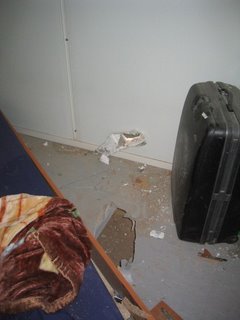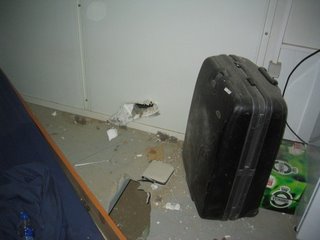Some observations and anecdotes from my recent 72-hour trip to Jordan and Qatar, Part I- We arrived in Amman on Monday night. We were immediately taken from the airplane to a private terminal while the paperwork for our passports were processed. As we waited beneath two large pictures of King Hussein and King Abdullah, porters came out to serve us cups of tea.
- On the twenty minute drive from the airfield to our hotel, we drove past what appeared to be very old neighborhoods built into steep hillsides, with narrow alleyways or stair cases climbing the hill between buildings. Even the masonry on the modern buildings was the same shade of tan as the granite hills they on which they sat, so as to blend seamlessly into the background.
- The sidewalks were lit by bright lights from shops with Arabic lettering, although some Western stores (i.e. Canon, Popeye's, Benihana's) were in English. The people on the street were a mixture of religious Sunni wearing skull caps and colorless dishashas ("man-dresses" or nightshirts) to working class Arabs wearing flannel.
- We didn't get to eat dinner on Monday night until around 11PM, which was an hour behind Baghdad time, so it was like eating dinner at midnight. On the recommendation from the Foreign Service Officer I was with, we went to "Cinqo du Mayo," which he promised was "the best Mexican in Amman." This probably is less impressive than it sounded at such a late hour. Don't get me wrong, it was not a bad restaurant, and I definitely enjoyed my first margarita in two months. But given that it was my first trip to Jordan, I honestly wished we'd chosen a cuisine a little more native to the Middle East than Mexican.
- The next day we attended the "Rebuild Iraq 2006" Conference, at which Ambassador Khalilzad was the keynote speaker for the morning session. About 400 Iraqi and Western businessmen crowded into a hotel ballroom to hear the panel of speakers that preceded the Ambassador, which included two Iraqi cabinet ministers. Amongst the other things Iraqi leaders need is a course on public speaking. They tended to drone on in monotone voices, reading their remarks as if they were leaning into a strong wind. The interpreters were also not having a good day, as they routinely fumbled the Arabic-to-English translations. (They did better translating from English-to-Arabic, however).
- The Ambassador's speech was received very well. It received some press coverage, which I'll try to link to if possible.
- Later that morning, the Ambassador had an audience with King Abdullah at the Royal Palace. The Palace is a surprisingly unpretentious mansion (there are gaudier houses in McLean or Potomac) accessed by a private road that snakes up a shaded, tree-lined hill. We sat with the Ambassador for roughly twenty minutes in a bright waiting room, the walls of which were covered by plaques, daggers, machine guns, and other paraphanalia from the King's days as a Commander in the Jordanian Special Forces. (Again, cups of tea were brought to us as we waited).
- While the Ambassador was in with the King (apparently I didn't rate an audience, which is okay, I just won't clear my schedule for His Highness the next time he comes to DC) and a lunch with Prince Ali (married to the beautiful former CNN Middle East correspondent Rim Brahimi), the traveling staff went to the U.S. Embassy to wait. Along the way we passed a large building on a hilltop with four minarets, which was described to me as a "mosque slash car museum slash intelligence headquarters." At the bottom of the hill from the King Hussein Medical Center, bleachers sat on the side of the road as if a parade were about to begin.
- I thought that Amman was beautiful, as you always seemed to either be on top of a hill with a panoramic view of the city, or in a valley surrounded by Mediterranean looking towns clinging to the hills. Yet if the city had been flat, it would have been fairly unremarkable. Also, there was a disturbing number of intersections and traffic circles with no lane markings, so driving through Amman felt a little like reverting to a Hobbesian state of nature.
- Between the Embassy and Prince Ali's house (where we picked the Ambassador up after his lunch) we passed a building marked as the "Philadelphia Hospital." (Unfortunately, nobody was able to explain this one to me). Also, atop one hill we saw signs for the "Mecca Mall" with a giant palm tree logo. Along the sides of the main road, barely ten minutes away from the center of Amman, people were farming small fields, using old workhorses to pull plows as buses and BMWs sped past.
Update: Upon my return to Baghdad, I had dinner with a friend who has traveled to Amman several times. When I commented on how beautiful I thought Amman's geography was, he said that its hills had the source of comment ever since it was Philadephia, the Roman name for Amman. So that not only explains the name for the hospital, but suggests I need to go back and do some more historical reading.- Prince Ali's house was a beautiful hilltop mansion. Amman was blessed with beautiful spring weather during the visit, a pleasant breeze (much cooler than Baghdad), and it was still early enough in the year that the grassy hills around the mansion (and the city) were still green rather than brown. This gave the Prince's mansion a distinctly California feel. As we picked up the Ambassador, Prince Ali and Princess Rim came out to wave goodbye to him. The Prince was wearing a blue blazer with khakis, thereby proving that my wife was wrong to say that look has gone out of style!! (But this means it was a good thing I didn't attend the lunch, as I was wearing the exact same combination, including the blue dress shirt).
- In the afternoon we attended a "Matchmaking Event" for 100 Iraqi businessmen to meet representatives of American companies. The Ambassador then was given a brief tour of the large pavilion in which companies (Iraq, Middle Eastern, and Western) were displaying their products. Traveling with Ambassador Khalilzad gives one the impression of what it is like to be a part of a rock star's entourage. Everywhere he went in the pavilion he was mobbed by Iraqis trying to have their pictures taken with him, to thank him and to shake his hand. After he leaves his post as ambassador, he could make a fortune as a product spokesperson in Iraq.
- Across from the pavilion grounds was the King Abdullah Mosque. We passed dozens of mosques during the day, but his one stood out with its giant blue dome and two towering minarets, each of which had sharper angles than usual, sort of reminding me of Isengard from Lord of the Rings.
- We took off that night after a reception at the U.S. Embassy. I saw the small, rotund Iraqi I recognized from meetings in DC and my first day here at the Embassy. He came up to briefly say hello, ask how I was doing, and then ran off to mingle with some of the Iraqi ministers who were present. Unfortunately, I didn't get a card from him, so I still don't know his name.
- We left Amman that night for the almost three hour flight to Doha, Qatar. I'll have the details on that part of the trip tomorrow.






